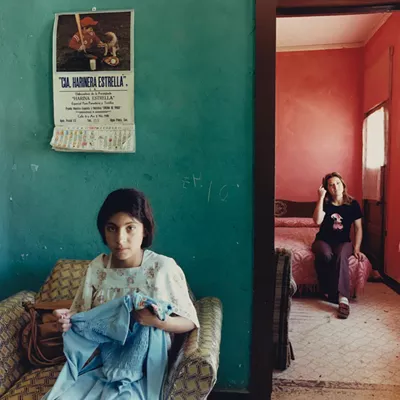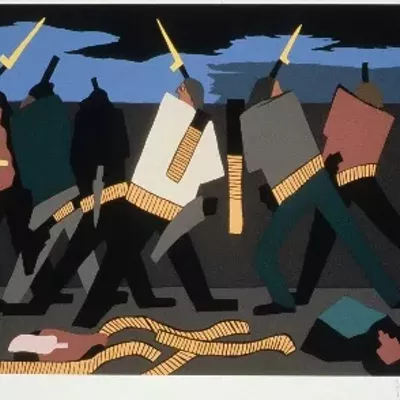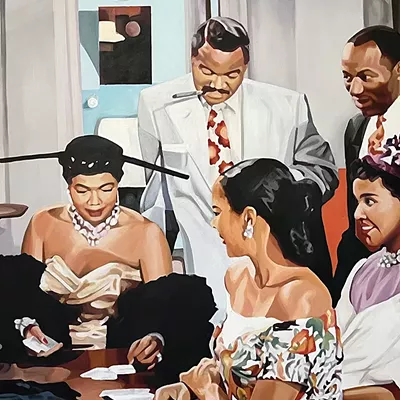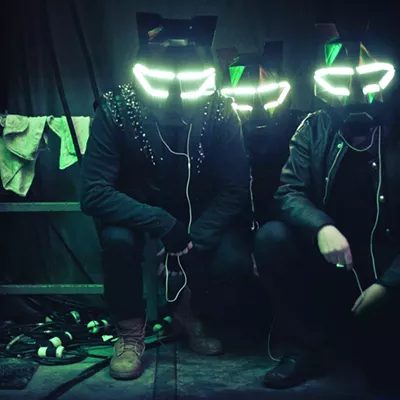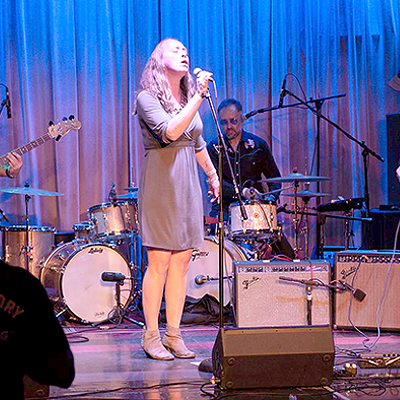The whole program was "immersed in contemporary, postmodern dance, dealing with people just starting out. It was fresh, full of new ideas," Wilson said by phone last week from a hotel in Chicago, where his troupe, Reggie Wilson/Fist & Heel Performance Group, was to perform the collaborative work Black Burlesque (revisited). The show, billed as a merger of African ritual with contemporary dance, will play Tucson's Centennial Hall Saturday night.
Wilson began delving into ages-old African movement when he was still a student dancer relishing new dance in New York. He started tracking down the dances and gestures that had been carried on slave ships to America, where they not only survived, but thrived.
"I wanted to research elements of dance in the African diaspora," Wilson said. "I took courses in anthropology and ethnography."
Wilson's family was from Milwaukee by way of the Mississippi Delta, and his research eventually took him back home, where he "very much grew up in the American Southern Baptist Church," down to the Delta, and on to Trinidad and to Africa.
"I wanted to see from the evidence what elements of African culture have been passed on, through the Middle Passage, through slavery, emancipation, Jim Crow, the civil rights movement, and the migration from the (U.S.) South to the North," Wilson said. "I tried to look at it from the perspective of empowerment, not victimization. How did people survive?" Why was one movement or ritual preserved, and not another? "Why this and not that?"
Some critics have called the 33-year-old choreographer's own movement "post-African." He himself said it's "difficult to label; it's postmodern, modern, contemporary." But his dual approach, contemporary combined with African-derived, still serves as the basis for his choreography.
This Saturday night, his latest piece, an unusual collaboration with two other artistic directors and their troupes, gets a single performance in Tucson. Black Burlesque (revisited) is a joyous evening-length work that incorporates contemporary American hip-hop music and dance, ancient African ring shouts and old-time gumboot dances, and circle and line dances from the Deep South. The music combines some elementary percussion with a cappella singing of "old songs, from the last century or before," Wilson noted, and a recorded "soundscape" of house and hip-hop music.
The multimedia concert will be performed by 12 dancers/singers from the three troupes, whose geographic locations not so coincidentally plot out the African diaspora. Noble Douglas Dance Company is a modern-dance troupe from Trinidad; Black Umfolosi is an a cappella singing group from Zimbabwe in Africa. Wilson's own Fist & Heel Performance Group is based in New York City.
"The three companies came together and created a new thing," Wilson said. "It's been layered and layered. Dancers sing and singers dance. It's multi-layered and crosses many lines of aesthetics, genres, historical memories."
Black Burlesque (revisited) comes to Tucson within weeks of its October world premiere at Dance Theater Workshop in New York City. Washington Post critic Sarah Kaufman praised a subsequent Maryland performance for its "lush, reverential display of African-derived music and dance. É The performers sing and dance in an unbroken current, blurring the distinctions between nationalities, filtering traditions into a new, somewhat mellowed aesthetic."
Wilson said he met Noble Douglas and Thomeki Dube, artistic director of Black Umfolosi, years ago, and they've worked together before. A preliminary piece called Black Burlesque was staged in 1995, hence the "revisited" of the current incarnation's title. It's impossible at this point to distinguish each one's contribution to the new work, Wilson said.
As an undergrad, Wilson danced briefly with hot Israeli choreographer Ohad Naharin, whose current troupe, Batsheva Dance, will play Centennial Hall in March. But the young dancer, who had already begun choreographing, soon decided to form his own troupe. In 1989, he created Fist & Heel Performance Group, drawing the name from the snide term once used to describe the worship rituals of black American slaves. Lately, Wilson has been accumulating the usual dance prizes, including a 2002 Guggenheim and a 2002 Bessie.
His research often takes him into Christian religious congregations that retain African traits. He's visited churches in Mississippi and Arkansas, and in the Caribbean he found a group called the Spiritual Baptists practicing "African expression in the execution of songs and rhythms. It's even stronger there than in the Delta." In southern Africa, he found an "Afro-Protestant" church named the Zionists "fusing traditional African structures into a Christian context."
He's fascinated by the intricate interconnections of cultural traits and survival.
"If you survive and if something of your culture survives, you can keep your identity," he said. "The group can keep its humanity."

